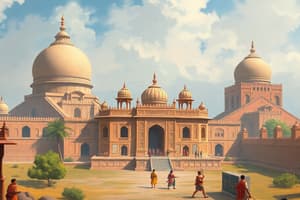Podcast
Questions and Answers
राजपूतों के खिलाफ मुगल साम्राज्य के खिलाफ विद्रोह क्यों असफल रहा?
राजपूतों के खिलाफ मुगल साम्राज्य के खिलाफ विद्रोह क्यों असफल रहा?
राजपूत राजाओं की एकता की कमी के कारण
कैसे ईस्ट इंडिया कंपनी ने राजपूताना के नियंत्रण को प्रभावित किया?
कैसे ईस्ट इंडिया कंपनी ने राजपूताना के नियंत्रण को प्रभावित किया?
सूरत की संधि और लैंप की सिद्धांत के माध्यम से
ब्रिटिश शासकाल कैसे राजपूत राजाओं के बीच विभाजन का लाभ उठाया?
ब्रिटिश शासकाल कैसे राजपूत राजाओं के बीच विभाजन का लाभ उठाया?
असंगतता का उपयोग करके
माउंट आबू जैन समुदाय ने किस प्रकार के शहर की स्थापना की?
माउंट आबू जैन समुदाय ने किस प्रकार के शहर की स्थापना की?
श्रावणबेलगोला में कौन-कौन से धर्मिक स्थानों की स्थापना हुई?
श्रावणबेलगोला में कौन-कौन से धर्मिक स्थानों की स्थापना हुई?
वैष्णववादियों ने किस प्रकार के राज्य स्थापित किए?
वैष्णववादियों ने किस प्रकार के राज्य स्थापित किए?
राजपूताना का इतिहास किस शताब्दी से शुरू हुआ था?
राजपूताना का इतिहास किस शताब्दी से शुरू हुआ था?
राजपूताना के राजपूतों ने किस शताब्दी में मुस्लिम शासकों के आक्रमणों को रोकने में महत्वपूर्ण भूमिका निभाई?
राजपूताना के राजपूतों ने किस शताब्दी में मुस्लिम शासकों के आक्रमणों को रोकने में महत्वपूर्ण भूमिका निभाई?
मुघल साम्राज्य किस महान शासक के नेतृत्व में राजपूताना में आया था?
मुघल साम्राज्य किस महान शासक के नेतृत्व में राजपूताना में आया था?
राजपूताना के राजाओं ने कौन-कौन से महान किले और महल बनवाए थे?
राजपूताना के राजाओं ने कौन-कौन से महान किले और महल बनवाए थे?
किस शताब्दी में मुघल इम्पीर का राजपूताना में प्रवेश हुआ था?
किस शताब्दी में मुघल इम्पीर का राजपूताना में प्रवेश हुआ था?
किस राजपूत राजा ने मुघलों के खिलाफ दक्खन के हिन्दू राज्यों के साथ मिलकर युद्ध किया था?
किस राजपूत राजा ने मुघलों के खिलाफ दक्खन के हिन्दू राज्यों के साथ मिलकर युद्ध किया था?
Flashcards are hidden until you start studying
Study Notes
Rajasthan's Evolving Past
Rajasthan, a land of fortresses and palaces, is a region steeped in history, with a kaleidoscope of cultural influences shaping its rich tapestry. From the ancient Rajputana era to the Mughal reign and British colonial period, let's delve into the fascinating history of Rajasthan and its significant subtopics.
Rajputana: A Kingdom of Warriors
Rajputana, encompassing modern-day Rajasthan, was a land of valiant warriors and noble kings. Its history dates back to the 8th century, with the rise of the Rajput clans. Although no singular emperor ruled over the region, the Rajputs, with their diverse lineages, created a chain of kingdoms, each with its own glory and legend.
The Rajputs gained prominence during the 10th century when they were instrumental in pushing back invasions from Muslim rulers. Their military prowess and code of chivalry, known as Nirbhaya (fearlessness), earned them a place in history. The Rajput kings built grand forts and palaces, such as the Amber Fort, City Palace, and Mehrangarh, which still stand as testaments to their grandeur and ingenuity.
Mughal Influence
In the 16th century, Rajputana witnessed the arrival of the Mughal Empire, led by Akbar the Great. The Mughals, who had conquered North India, sought to establish diplomatic ties with the Rajputs. Many Rajput rulers, including Raja Man Singh of Amber and Raja Udai Singh of Mewar, fought alongside the Mughals against Hindu kingdoms in the Deccan.
Despite these alliances, Rajput pride and independence remained strong, eventually leading to conflicts. The Mughal emperor Aurangzeb's aggressive rule and the encroachment of the Marathas prompted many Rajput rulers to revolt. The rebellion, however, proved futile, as the Rajputs were unable to unite against the Mughals.
British Colonial Period
Rajputana, now divided into several princely states, became a focal point of the East India Company's expansion in the 19th century. In 1818, the Treaty of Surat and the Doctrine of Lapse facilitated the Company's control over the region. In 1857, the Indian Rebellion, although quelled, demonstrated the Rajputs' desire for sovereignty.
The British Raj took advantage of the disunity among the Rajput states and imposed direct rule. The British also established a series of institutions, such as the Ajmer-Merwara State, and the Central India Agency, which governed the princely states. However, the imposition of British rule did not dampen the Rajputs' spirit; their sense of pride and chivalry continued to inspire generations to come.
Enduring Civilizations
Rajasthan's history is marked by the coexistence of diverse communities, including the Jains, Buddhists, Brahmins, and Vaishnavites. The Jains, with their non-violent principles, established flourishing towns such as Mount Abu, while the Buddhists constructed magnificent stupas and temples, such as the Sambhar Lake Stupa and the Digambar Jain Temple in Shravanbelagola.
The Brahmins, with their deep-rooted religious traditions, played an integral role in preserving the Sanskrit language and literature, while the Vaishnavites founded their own kingdoms, such as the Mewar dynasty. Together, these diverse communities contributed to a rich tapestry of civilization in Rajasthan, one that continues to enthrall and inspire today.
In summary, Rajasthan's history is a testimony to the resilience of its people and their determination to remain true to their values and traditions. From the ancient Rajputana era to the Mughal reign and the British colonial period, Rajasthan's journey is one that continues to captivate and educate, offering a glimpse into the complexities of human history.
Studying That Suits You
Use AI to generate personalized quizzes and flashcards to suit your learning preferences.




